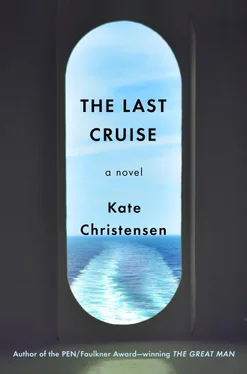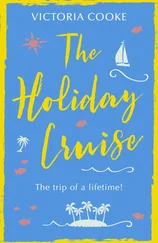“Let’s go, you nudniks!” Miriam flapped her hands impatiently at her distinguished colleagues. She couldn’t help it, she was agitated and eager to escape.
Somehow, over the course of the next few minutes, she managed to disengage from the Weisses and hustle the three old men into the van and oversee the stowing of all their instruments and luggage and tip the two valets. She buckled herself in with a long, relieved sigh. One hurdle leapt over: getting out of the hotel. There were many more, of course: getting everyone aboard, then settled, then calm and focused enough to run through Rivka’s quartet at least once before tonight. They’d have to find a practice room. Life was nothing but a series of hurdles.
The driver turned onto a bridge that crossed to the other side of the harbor, and immediately they were stuck in traffic, a glum morass of windshields and bumpers inching along toward the docks. Miriam’s mind drifted to tonight’s performance, during cocktail hour in the main dining room, as the ship steamed out to sea. They’d agreed on their lightest, most shamelessly crowd-pleasing program: Vivaldi’s Four Seasons followed by Mozart’s Eine Kleine Nachtmusik. Miriam planned to wear her sleeveless purple sheath dress. It always made her feel glamorous. Playing those warhorses, she’d need to keep her morale up however she could. Maybe a vodka and tomato juice beforehand. But even this pleasant thought did little to blunt her dread of the cramped quarters, the crowds and claustrophobia, all the inconveniences of shipboard life. And the Weiss quartet: she couldn’t forget that for one minute.
*
Down in the galley, Mick inspected fifteen suckling pigs. They were coming along nicely; this was good, because they had to be carved and served at the sail-away party in three hours. They’d had to flash-brine them; normally they steeped overnight, but there hadn’t been time for that. They lay nestled like nursery-rhyme characters, tucked in their baking pans, bedecked with pineapple rings and shiny with glaze made of sea salt, Coca-Cola, pineapple juice, and liquid smoke to goose the flavors along. Looking at the innocent little bodies, their baby-piggy faces so trustingly soft, eyes closed as if they were only sleeping, he was reminded out of nowhere of a cannibalistic recipe he’d once read about, some tribe’s ritualistic slaughter of young female virgins who were then marinated in wild herbs and spring water for a few days, tenderized with pineapple and wrapped in banana leaves, and buried in fire pits to slow roast. He’d always thought that sounded delicious. If he had to eat human flesh, a juvenile female would be his first choice.
Western culture’s proscription against human flesh had always amused him. A culture that considered edible such stuff as brains, snails, fungi, frogs, fermented vegetable matter, eyes, and intestines seemed mildly hypocritical when they eschewed their own apparently tasty and undeniably plentiful kind. No doubt the primary reason the taboo against cannibalism existed was that human meat was so delicious. Otherwise, there would be no need for it. The Vietnamese loved duck embryos cooked in their own eggshells, which they downed with beer. In Sardinia, they ate sheep’s cheese in which flies had laid eggs and maggots had helped the innards of the cheese to rot. Cambodian fried tarantulas were a delicacy; Mick had never eaten them but imagined he would not like them very much. He had also never eaten Norwegian cheese made with a whole sheep’s head, an actual fermented, reeking head on a plate, presumably served with a knife and a loaf of bread; he had no desire to, either. He wasn’t a super-macho food sensationalist, he wasn’t addicted to that adrenaline high of showoff gross-out consumption for its own sake like a lot of the food guys on TV, but as a matter of course, out of curiosity, he’d eaten ants and grasshoppers in Mexico, worms in California, cockroach-like beetles somewhere else, he couldn’t remember, and blood sausage everywhere. Why were these considered edible and human flesh not? Meat was meat.
“Behind you, Chef,” said Consuelo, squeezing around him with a tray of something hot. She was in charge of running the buffet-galley meat station. These were her roasting piglets, in other words, and Mick was standing right in her way with his ruminations and woolgathering.
He moved away from the oven and back to the task at hand. At the moment, while keeping an eye on the so-far highly efficient progress of tonight’s ersatz luau, he was conducting an in-depth, largely mental inventory of his stores and their levels of freshness and perishability. The guy who was supposed to be here, a nonverbal Serbian meathead named Anto who was nonetheless one of the best executive preps in the business, liked to work off the cuff, improvising like a blind musician with whatever he had on hand. Normally on cruises, the stores were all arranged and earmarked and synced according to location, date, and so forth, programmed into computers and marched out with clockwork precision to fulfill the predetermined menu’s promises, but Anto was famous for his wild hairs of inspiration and flights of fancy involving many ingredients and a sudden attack of genius. The higher-ups tolerated this because he always, according to cruise-industry legend, pulled it off with panache. Passengers often requested repeats of dishes he’d thrown together. Some of them became menu staples.
But Anto had slipped and fallen hard on his ass a few days before, apparently (so Mick had been able to gather from one of the chefs who’d been working with him) while rushing somewhere with a heavy tray of an hors d’oeuvre he’d been in the process of inventing, involving chestnuts, bacon, habanero peppers, port wine, and goat cheese. He’d slipped a disc and that was that. He was out of commission for a long time, poor guy. Management had tapped Mick to take his place, largely, as far as Mick could tell, because he was available, his primary qualification. His first time in this higher-ranking job, as it happened, was going to be a two-week ordeal of seat-of-the-pants navigation without a chart or flight plan, with the likes of Consuelo as his first line of defense. He’d just have to pretend he was Anto and get the job done.
“Excuse me, Chef,” said Consuelo at his elbow. He found himself staring into a walk-in filled with seafood. He had been handling cool, firm mackerels one by one, as if he were still inspecting deliveries on the wharf before dawn. “I want to consult about the piggies.”
“Go ahead.”
“How can we get more flavor into them? I’m worried about the flash-brining.”
“The liquid smoke should do it.”
She handed him a skewer to taste. “Ham kebab,” she said.
He wrapped his molars around the back piece and slid the whole thing at once into his mouth. Fresh pineapple chunks interspersed with chunks of ham and drizzled with honey, then grilled. Salty, fruity, sweet, meaty—simple, but classic.
“Good,” he said. “Needs a splash of soy. Not too much, the meat is already salty.”
“Yes, Chef,” she said. “My team is working on pork belly sliders.”
“Something spicy on the sliders. What kind of bread?”
“No buns,” she said. “We’re breading and frying squares of pork belly, with pineapple and bacon in the middle, spicy mayo, toothpicks.”
“Okay,” he said.
She waited for an instant, as if she was expecting more of a reaction from him. Determined to bring her into line, he inclined his head to dismiss her. Immediately, she went back to her station.
The entertainment and cruise director, a tiny blond American with a silly name he instantly forgot, had been thrilled about the Hawaiian-themed launch-night buffet party. She’d passed Mick on to one of her staff, a young Korean American man named Park. “I love it,” he’d cried. “I will round up the tiki lamps!” Mick liked working with gay American entertainment staff, possibly because they liked working with him. He also, incidentally, liked being touched by American men, gay or straight. His job was lonely and hard and he didn’t have much physical contact with anyone, aside from bumping into people on the line accidentally. Entertainment people were demonstrative, theatrical, handsy. Mick knew that American men weren’t socially permitted to touch one another the way men in other cultures could as a matter of course. Straight American men were terrified of being perceived as gay. Gay American men were often careful to hide it on the job. But entertainment staff seemed looser, less worried about all that, though it was still an issue, Mick knew. So when they touched Mick, it felt extra tender, always slightly sexual with a whiff of nervousness, no matter what the toucher’s sexual orientation was. And the entertainment staff were separate from the hierarchy of the kitchen staff, although the two teams worked closely together, so Mick could relax around that crew without worrying about breaking protocol.
Читать дальше












